Effective Guide: How to Stop Dripping Noise from Air Conditioner
Are you in a battle with the incessant dripping noise from your air conditioner? Trust me; your tranquility deserves better. As an experienced HVAC technician, I know how confounding this nuisance can be. Not only does it disturb your peace, but it also indicates underlying issues with your AC unit that needs resolving.
In this insightful guide, we’ll delve into understanding the root causes behind your air conditioner’s annoying drip. We will navigate together through possible culprits from dirt-clogged filters to improper installations, shedding light on the dilemmas you face.
Armed with practical, real-world solutions, you’ll soon be on your way to saying goodbye to the frustrating dripping noise. Keep reading to reclaim your peace and quiet by making your AC unit drip-free once again.
Understanding the Source of the Dripping Noise
Dripping noises from an air conditioner can be incredibly annoying, and figuring out where they’re coming from is half the battle. Whether it’s due to water hitting internal components or other issues, identifying the source is crucial for effective troubleshooting and resolution.
Common Causes of Dripping Noise
- Water Hitting Surfaces: Imagine water cascading inside your AC unit, striking different surfaces. This contact can create quite a racket, especially if water from an upper component drips down to a lower area.
- Dirty Air Filters: When air filters get clogged with dust and debris, they restrict airflow. Poor airflow can lead to condensation issues, making an unmistakable dripping noise. Simply checking and changing filters can go a long way in avoiding this.
- Blocked Condensate Drain Lines: Debris can clog up drain lines, resulting in water overflow and those dreaded drips. The solution? Regularly clear these blockages to keep the water flowing out as it should.
- Low Refrigerant Levels: If the refrigerant is low, the evaporator coils can freeze up. When they eventually thaw, you might hear dripping from the melting ice. Keeping an eye on refrigerant levels helps maintain a drip-free AC.
- Faulty Condensate Pumps: Sometimes the pump responsible for moving water gets a little lazy or altogether stops working. Repairing or replacing a faulty condensate pump can eliminate those unwanted drips.
- Incorrect Installation: Make sure your AC unit is properly leveled and sealed. Poor installation can lead to water leakage, causing dripping sounds. Adjusting the installation can make a big difference.
Challenges in Identifying Drip Location
Pinpointing where the dripping noise is coming from isn’t always straightforward.
Two major challenges can complicate the detective work:
- Sound Movement: The way sound travels within the AC unit can mislead you. It’s common for sound to bounce around, making it hard to locate the exact origin of the drip.
-
Acoustics Variances: The unit’s acoustics can play tricks on your ears, causing you to think the dripping noise comes from one place when it’s actually coming from another part. This can lead to a wild goose chase if you’re not careful.
In this video, learn how to effectively clean your air filters and unclog the water drain pipe to stop dripping noises from your air conditioner.
Inspecting and Fixing Common Issues
If your air conditioner is making a dripping noise, it’s likely due to some common issues that can be inspected and fixed. From dirty air filters to improper installation, here’s what you should look out for and how to resolve it.
Checking Air Filters
Dirty air filters are a common culprit. When airflow gets blocked, it can lead to coil icing. As the ice melts, you’ll hear that annoying dripping noise. To dodge this, swap out your air filters every 1-3 months. Think of it as regular upkeep to keep your system breathing easily.
Unblocking the Condensate Drain Line
Using Tools Like a Wet/Dry Vacuum or a Plumber’s Snake
The condensate drain line might get choked with debris over time, leading to water overflow and an irritating drip. Tools like a wet/dry vacuum or a plumber’s snake are your best friends here; they can clear out those blockages effortlessly.
Regular Cleaning to Prevent Clogs
Consistent cleaning keeps clogs at bay. Routine maintenance is vital to avoid dirt buildup, ensuring that water flows smoothly and quietly.
Refilling Low Refrigerant Levels
When refrigerant levels are low, the evaporator coils can freeze. As the ice melts, you’ll be left with a dripping noise. Make sure to have an HVAC technician check and refill those levels. They can also handle any repairs, keeping the system efficient and quiet.
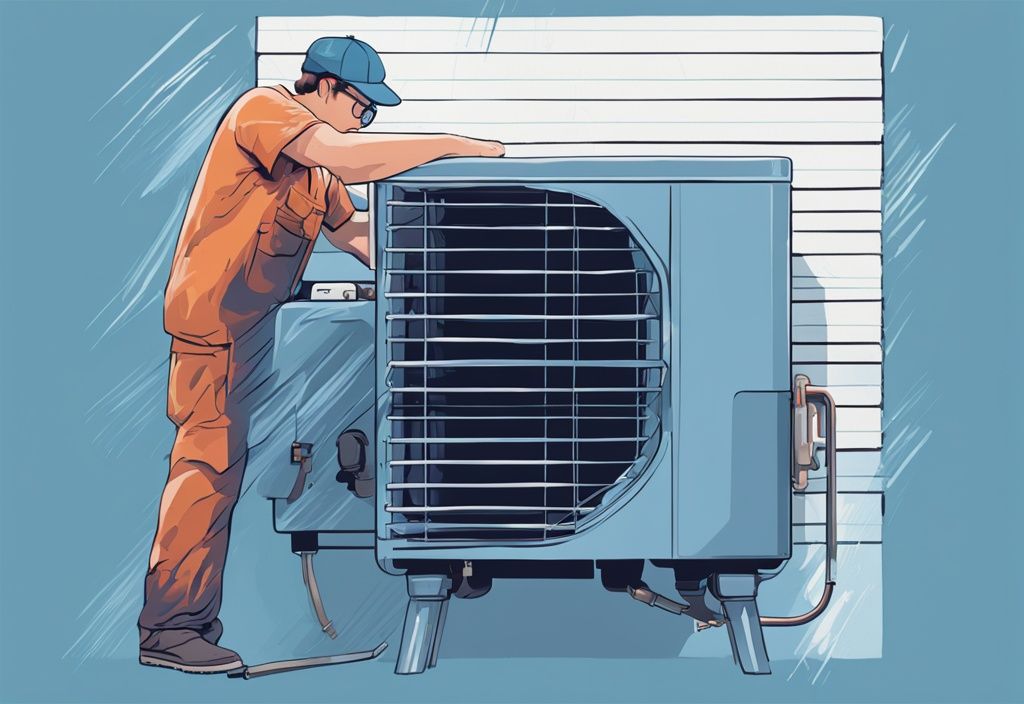
Repairing or Replacing Broken Condensate Pumps
Condensate pumps play a crucial role in removing water from your AC system. If they fail, water builds up and leads to dripping sounds. Regularly check these pumps and repair or replace them if needed to keep things running smoothly.
Ensuring Correct Installation
Checking Unit Level
If your air conditioner unit isn’t correctly leveled, water can pool and cause that pesky dripping noise. Make sure the unit is level to facilitate proper drainage.
Securing All Seals
Inspect all seals around your unit. Any leaks can lead to water escaping and causing those dripping noises. Properly secured seals are key to preventing this issue.
Inspecting and Positioning the PVC Drip Line
Check your PVC drip line to ensure it’s positioned and installed correctly. Proper placement guarantees efficient water flow, steering clear of those annoying drips.
Correct Placement of Tee Connections and Pipe Angling
Properly placing tee connections and angling pipes can minimize noise. Position tee connections horizontally and use bends that aid water flow. An efficiently angled pipe can reduce noise from vertical drips, contributing to a quieter operation.
Preventing Ice Formation on Evaporator Coils
The key to stopping that pesky dripping noise from your air conditioner often lies in preventing ice formation on the evaporator coils. Let’s delve into a few practical ways to tackle this issue.
Using Proper Insulation
One of the most important steps in preventing evaporator coils from freezing is to use proper insulation. Think of it like wrapping a cozy blanket around the coils. This insulation helps maintain a steady temperature, reducing the chance of ice forming and, in turn, eliminating that annoying dripping noise. Make sure to use high-quality insulating materials designed specifically for HVAC systems. These materials should securely wrap around the coils, without leaving any gaps or spaces where cold air can escape and cause condensation. Trust me, a little extra effort here goes a long way.
Setting AC to Manage Humidity Levels
Let’s talk about your air conditioner’s settings. They play a significant role in keeping indoor humidity levels in check, which directly affects condensation and ice formation on the coils. Setting your AC to a comfortable mid-range temperature can help maintain an ideal humidity level. This prevents moisture from condensing and freezing on the coils, which helps stop the dripping noise from your air conditioner.
Additionally, consider using the “auto” mode instead of “on” for the fan. The “auto” mode allows the system to cycle off, giving it a chance to remove moisture before the coils have an opportunity to freeze. It’s a simple adjustment but can make a world of difference.
Utilizing a Dehumidifier
No one likes dealing with high humidity, and your air conditioner certainly doesn’t either. A dehumidifier can be a valuable addition to your home’s climate control system, especially in those sticky summer months. By reducing the humidity level in the air, a dehumidifier lightens the load on your AC unit. This allows it to run more efficiently without creating excessive condensation that could lead to dripping noises. If you’re experiencing issues with your dehumidifier or AC unit, you might want to check out our guide on Arctic Air Tower troubleshooting problems.
Place the dehumidifier in a central location in your home. Don’t forget to regularly empty and maintain it for optimal performance. This small investment can help maintain lower humidity levels and even extend the lifespan of your AC system. Less noise, more comfort—sounds like a win-win to me!
Advanced Techniques for Noise Reduction
Dealing with the annoying drip-drip sound from your air conditioner can be challenging. To help you out, I’ve compiled some advanced techniques to tackle this issue effectively. Let’s dive in and explore these methods step-by-step.
Using Heavy and Dense Objects to Absorb Impact
To stop that dripping noise from your air conditioner, try placing heavy and dense objects like thick metal plates or bricks under the drip point. These objects are great at absorbing the impact of the dripping water. Just make sure they’re sloped correctly to allow water runoff and prevent any pooling, which can lead to other problems down the road.
Implementing a Rain Chain
A rain chain can be a creative and effective solution to silence the dripping noise from your AC unit. Attach a rain chain directly to the drip point so it creates a quieter path for the water flow. If you have multiple drip points, consider using a pan to catch the drips and direct them to the rain chain, which will ensure a quieter drainage system overall.
Soundproofing the Air Conditioner or Room
Soundproofing is another great strategy for stopping the dripping noise from your air conditioner. Use soundproofing materials like acoustic panels or foam to block or absorb the noise caused by the dripping water. You can cover the areas around the air conditioner or target specific sections of the room to significantly reduce the noise impact.
Employing Noise-Canceling Devices
If you’re looking for a quick fix, noise-canceling devices can help mask those annoying dripping sounds from your air conditioner. These devices emit white noise or soothing sounds that can drown out the dripping, making your environment more comfortable and serene. Place the noise-canceling devices strategically to get the best sound masking effect.
Investing in High-Quality Equipment
Investing in high-quality air conditioning units and components can make a world of difference when it comes to reducing annoying dripping noises. High-quality equipment tends to be designed with better materials and advanced technology, which makes it less prone to issues like leaking and dripping. It’s a worthwhile investment for long-term peace and quiet.
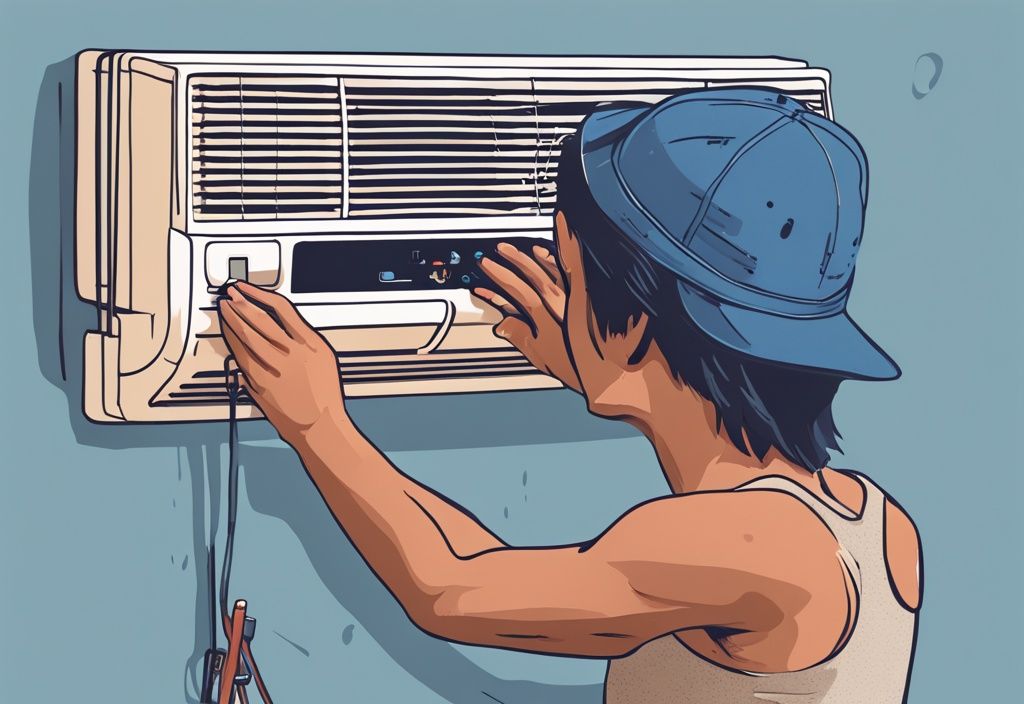
Regular Maintenance and Professional Help
Proper maintenance and seeking help from professionals are critical to keeping your air conditioner running efficiently. Let’s dive into specific tasks that can help you stop that annoying dripping noise.
Cleaning Condenser Coils
Regularly cleaning the condenser coils is crucial for preventing issues like dripping noises. Dirty coils can cause the system to overheat, leading to excessive condensation and those pesky drips. Here’s how you can tackle the problem:
- Turn off the power: Always turn off the power before cleaning any part of your air conditioner to avoid any accidents.
- Access the coils: Remove the outer casing of the unit to get to the condenser coils.
- Use appropriate cleaning tools: A soft brush or a vacuum cleaner can help gently remove the dirt and debris from the coils.
- Apply a coil cleaner: Spray a commercial coil cleaner and let it sit for 5-10 minutes. Then rinse it off with water.
- Regular maintenance: Aim to clean the coils at least once a year to keep your system efficient and minimize the risk of dripping noises.
Inspecting System for Blockages and Freezing Coils
Regular inspections for blockages and freezing coils are key to stopping dripping noise from your air conditioner. Blockages can cause water overflow, while frozen coils can result in ice melting and dripping:
- Check the condensate drain line: Make sure there are no obstructions in the drain line that could cause water to back up and overflow.
- Inspect the air filters: Dirty air filters can hinder airflow and cause the coils to freeze. Clean or replace them as needed.
- Check refrigerant levels: Low refrigerant can lead to coil freezing. Consult a technician to refill refrigerant and fix any leaks.
- Monitor system performance: Keep an eye on your unit’s performance. Early identification of issues, like unusual noises or inadequate cooling, can prevent bigger problems.
Scheduling Professional HVAC Technician Visits
Having a professional HVAC technician check your system regularly is crucial for preventing dripping noises:
- Bi-annual maintenance: Schedule maintenance visits twice a year to ensure all components are in good working condition.
- Comprehensive checks: Technicians will perform thorough system checks, including inspecting and cleaning coils, checking refrigerant levels, and ensuring there are no blockages.
- Emergency repairs: If you encounter any unexpected issues, like severe dripping noises, seek professional help promptly.
- Professional advice: Technicians can offer advice on best practices to maintain your system and prevent issues like dripping noises.
Proper Usage Tips to Prevent Dripping Noises
Wondering how to stop that annoying dripping noise from your air conditioner? These practical tips will help you keep your AC running smoothly without unwanted sounds.
Encouraging Proper AC Usage
- Follow Manufacturer Guidelines: To keep dripping noises at bay, always stick to the manufacturer’s instructions for using and maintaining your air conditioner. These guidelines aren’t just for show; they’re there to ensure your AC performs at its best.
- Maintain Optimal Temperature Settings: Set your AC to a comfortable temperature. Cranking it up or down too much can cause extra condensation, which often leads to that pesky dripping sound.
- Use Automatic Modes: Modern AC units come with automatic modes and timers. Letting the system handle itself can prevent overworking, thereby cutting down on condensation and the associated dripping noise.
- Regular Maintenance: Regularly cleaning filters and inspecting parts keeps your AC running smoothly. Simple upkeep can go a long way in preventing those dripping sounds, often caused by blocked filters or worn-out parts.
Avoiding Overworking the Air Conditioner
- Prevent Excessive Usage: Running your AC non-stop without any breaks isn’t good for it. This can lead to overworking, more condensation, and dripping noises. Give your AC a rest now and then to keep it running efficiently.
- Address Hot Spots: If some areas in your home are warmer, your AC will work harder. Fans or closed blinds can help distribute cool air evenly, reducing strain on your AC and preventing overuse.
- Check and Seal Gaps: Look for any gaps or cracks where cool air might escape. Sealing these up will mean your AC doesn’t have to work as hard to keep your space cool.
- Maintain Proper Insulation: Good insulation will help retain the cool air inside your home. This reduces the load on your AC, lessening condensation and those unwanted dripping noises.
- Use a Dehumidifier: A dehumidifier can help manage the moisture levels in your home. Less moisture means your AC won’t face the extra burden of condensation, keeping dripping noises to a minimum.
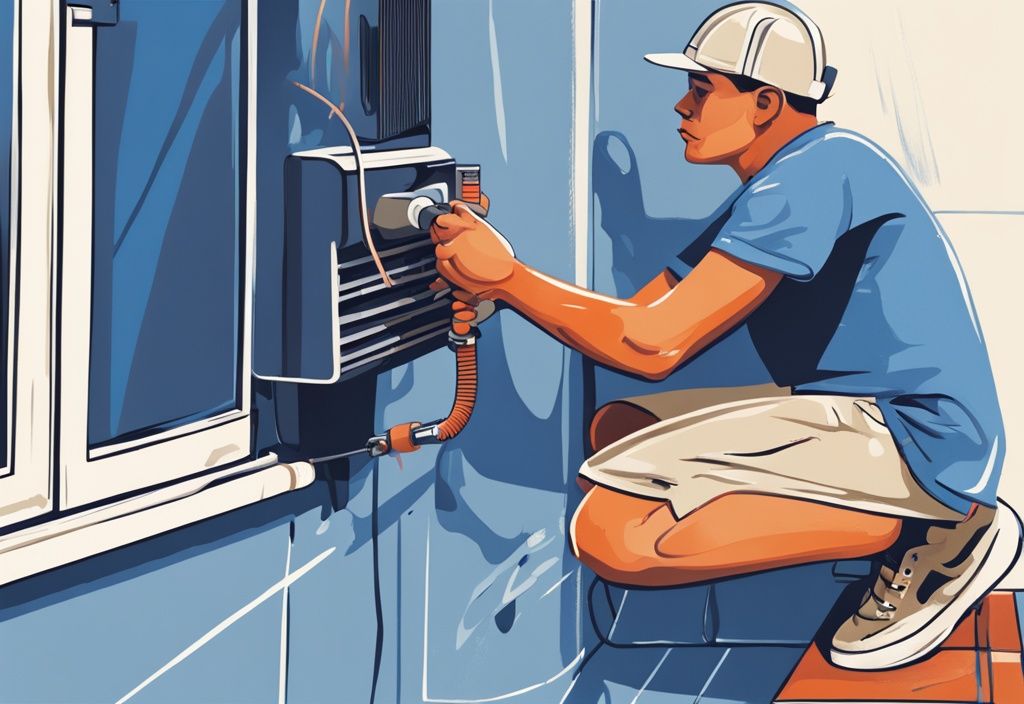
Conclusion
Stopping the dripping noise from your air conditioner involves a combination of regular maintenance, proper installation, and awareness of common issues.
Understanding the root causes, such as dirty air filters, blocked condensate drain lines, and low refrigerant levels, allows you to take effective actions.
Regularly inspecting and replacing components like air filters and condensate pumps, ensuring proper unit installation, and managing humidity levels can greatly contribute to quieter air conditioning operations.
For more advanced noise reduction, here are some practical strategies:
- Use heavy and dense objects to absorb impact.
- Implement a rain chain for enhanced drainage.
- Invest in soundproofing materials for your unit.
Regular maintenance and professional HVAC technician visits ensure that your system is functioning optimally and any potential issues are addressed promptly, as detailed in the guidelines provided by the U.S. Department of Energy on maintaining your air conditioner here.
Adopting proper usage habits will further prevent overworking your unit, thereby reducing the likelihood of dripping noises. Addressing these noisy drips promptly not only enhances your comfort but also prolongs the lifespan of your air conditioning unit. If you’re experiencing other issues such as my portable ac keeps tripping the breaker, be sure to check for electrical problems or consult a professional.
____
By following these comprehensive guidelines, you can maintain a peaceful home environment free from the annoyance of dripping air conditioners.
FAQ
Addressing Common Dripping Noises in Air Conditioners
How often should I change my AC air filter?
Changing air filters every 1-3 months is essential. This simple task helps maintain proper airflow and can prevent pesky issues like coil icing, which might lead to those annoying dripping noises you hate. Trust me, a clean filter makes a world of difference.
Why does my air conditioner only drip on hot days?
Ah, hot days! They really put stress on your AC unit, don’t they? When it’s blazing outside, your air conditioner works harder, producing more condensation. Consequently, the excess water might result in that worrisome dripping noise. It’s just the AC doing its best to keep you cool.
Can a technician fix all sources of dripping noise?
Absolutely! An HVAC technician, like yours truly, can tackle nearly all causes of dripping noises. Whether it’s a blocked drain line, low refrigerant levels, or a broken condensate pump, a technician can sort it out. We’ve seen it all and fixed it all.
Will using a dehumidifier reduce dripping noise?
You bet! Using a dehumidifier can significantly reduce dripping noises. By decreasing the moisture levels in the air, a dehumidifier eases the load on your AC unit, preventing it from producing excessive condensation. Problem solved!
What kind of noise-canceling devices work best for AC units?
For those relentless dripping noises, noise-canceling devices like those emitting white noise or soothing sounds can be real lifesavers. They mask the annoying drips and help create a serene environment in your home. Trust these little gadgets to bring you some peace and quiet.
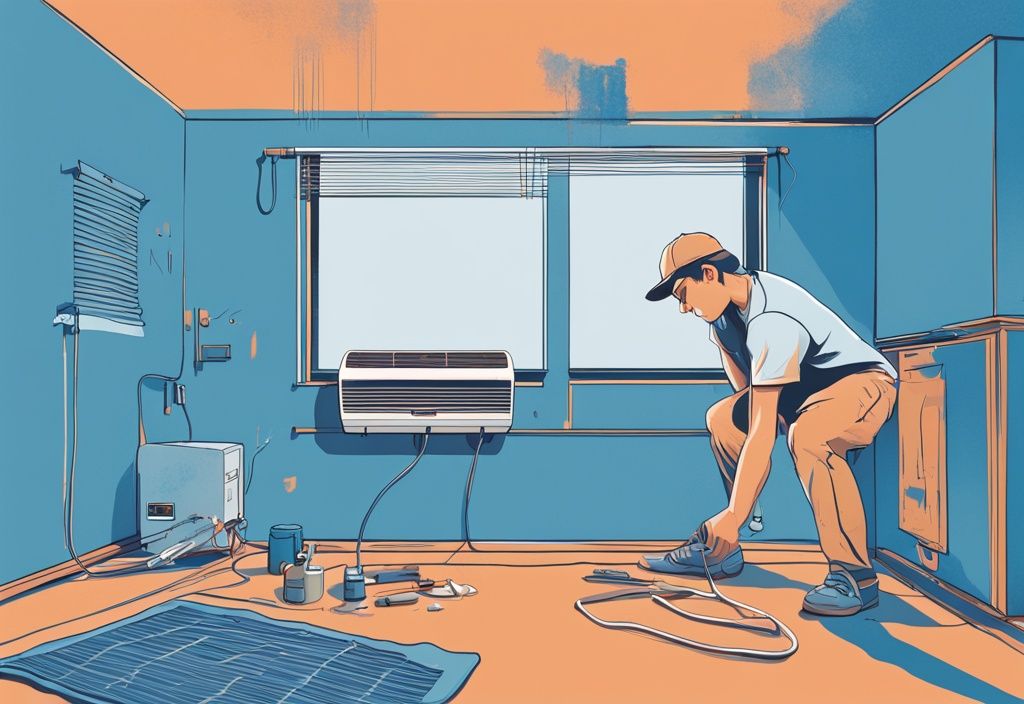
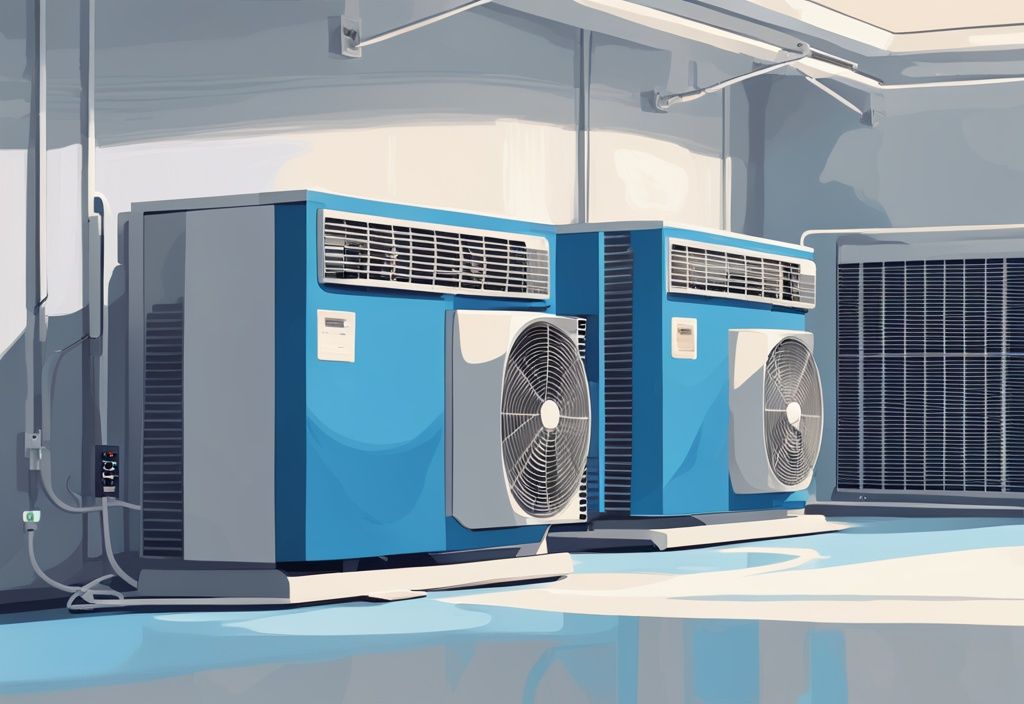

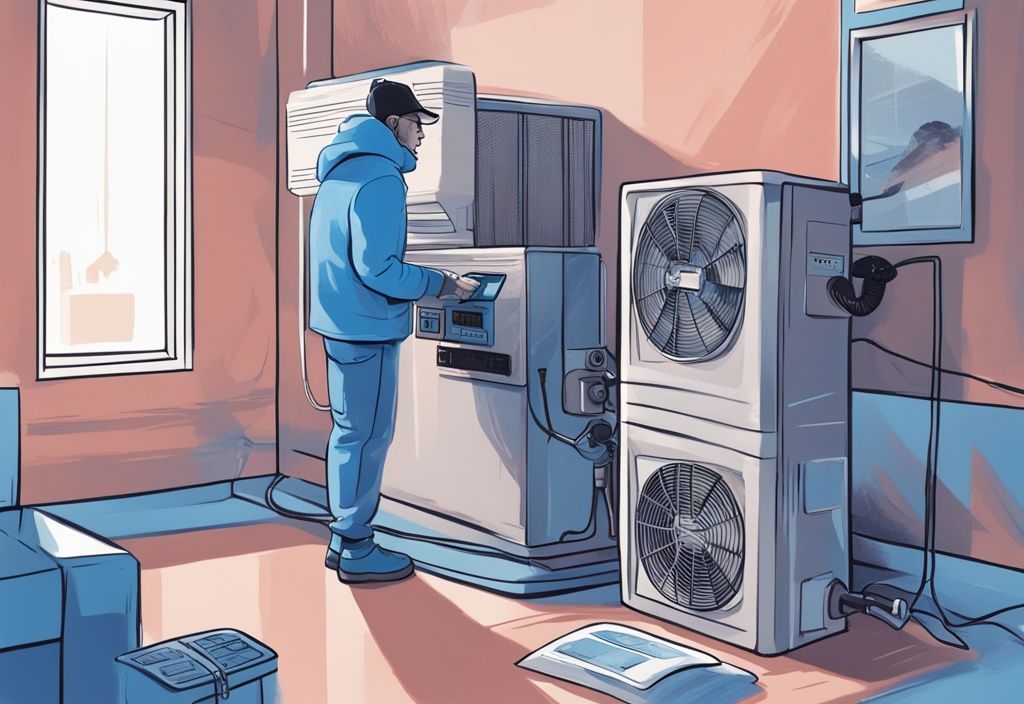
Post Comment